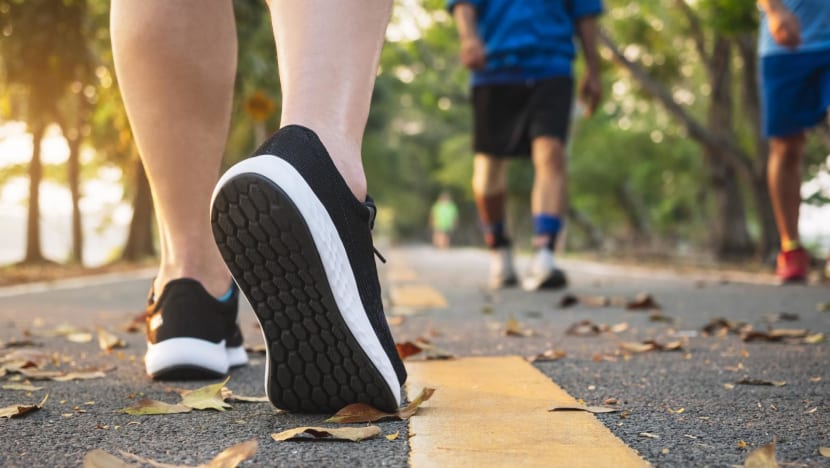Commentary: ‘No money, no walk’ – is cash the ultimate motivator for staying active?
While cash rewards have a place in health promotion programmes, it’s not the only effective motivator, say Duke-NUS Medical School’s Eric Finkelstein and Michelle Chow.

We all know that exercising and staying fit is important, but sometimes we need a little push to get off the couch. (Photo: iStock/VTT Studio)

This audio is generated by an AI tool.
SINGAPORE: We all know that exercising and staying fit is important, but sometimes we need a little push to get off the couch.
Since its inception in 2015, the launch of the Health Promotion Board’s (HPB) National Steps Challenge has been met with overwhelming success. Offering health points that can be exchanged for cash-like rewards such as NTUC FairPrice vouchers, the programme has garnered a whopping 1.7 million participants - more than a quarter of Singapore’s population.
Many similar reward-based physical activity programmes have since been rolled out by both the public and private sectors, including HPB’s gamified Lumihealth app and Manulife’s ManulifeMOVE reward programme.
Yet, maintaining physical activity has proven to be a challenge for many of us.
According to National Population Health Surveys, the number of people getting enough physical activity steadily declined between 2019 to 2022. Despite the slight improvement in 2023, the total proportion of people with sufficient physical activity has not yet recovered to pre-COVID levels. The increase in work-from-home arrangements may partly explain the decline and slow recovery, as it reduces the time spent travelling to work.
Such trends are not confined to Singapore. According to a recent World Health Organization report, almost one-third (31 per cent) of adults globally, or a staggering 1.8 billion people, are “physically inactive”, meaning they do not meet the global recommendation of at least 150 minutes of moderate-intensity physical activity per week. If the current trajectory continues, this number is expected to increase to 35 per cent by 2030.
FREE SPA DAY OR PURE HARD CASH?
So, how else can we motivate people to stay active?
That’s what a group of us researchers at Duke-NUS Medical School sought to find out.
In a four-month study, we compared 310 participants in two groups: One was offered cash rewards for meeting their monthly step goals, while the other was offered hedonic (pleasurable) rewards of the same monetary value such as spa treatments, movie tickets and fine dining experiences.
Why these options? Cash is known to be effective at changing behaviours, but we wanted to test a bolder theory to find out if hedonic rewards might be just as, if not more, effective than pure hard cash at encouraging physical activity.
Our study, called Trial Evaluating Hedonic Versus Cash Incentives, found that participants who had received hedonic rewards increased their daily step count by 1,000 steps on average, whereas the cash group managed an additional 870 steps.
Such step increments have been shown to be clinically significant as walking an extra 1,000 steps a day has been linked to a 15 per cent reduction in overall mortality, whilst an extra 500 steps a day is linked to a 7 per cent reduction in deaths from heart-related diseases.
CASH ISN’T ALWAYS KING
“But with cash I can buy anything I want, why not just give cash?” some might question.
While it’s true that cash can be exchanged for almost anything, cracks can start to appear in its motivational power when pitted against hedonic rewards, even when both hold equal value.
Research has shown that people tend to view cash rewards as extra income meant to be spent on practical items such as meals or bills. On the other hand, hedonic rewards offer a guilt-free opportunity to indulge in “wants”, creating a greater sense of enjoyment.
In fact, a series of studies conducted by Choi & Presslee among the general population suggest that hedonic rewards can be a stronger motivator than cash when they offer new experiences, are fun or exciting and are perceived to be distinct from regular income.
This helps enhance the emotional and psychological benefits of physical activity by linking it with positive feelings and memories. Plus, being able to choose your own preferred hedonic reward makes it more personal and motivating.
For instance, our study gave participants a wide-ranging choice of hedonic rewards each month, ranging from fine dining and relaxing spa treatments, to thrilling theme park outings and concerts.
It is also worth mentioning that hedonic rewards can be potentially more cost-effective than cash. Organisers of physical activity programmes, for example, could offer a S$50-like hedonic reward without actually having to spend that amount, by securing bulk discounts or forming partnerships with travel agencies, event organisers and entertainment providers.
While cash rewards have a place in health promotion programmes, it’s not the only effective motivator. Non-cash rewards that are personal, novel and pleasurable can be just as effective, if not more so.
In the end, whether it’s cash, a free spa treatment or fine dining experience, the ultimate goal is the same - to get people moving and staying active. And when that happens, everybody wins.
Eric Finkelstein is a health economist and professor with the Health Services and Systems Research Programme at Duke-NUS Medical School and the executive director of the Lien Centre for Palliative Care. Michelle Chow is a research assistant with Lien Centre for Palliative Care at Duke-NUS Medical School.




















